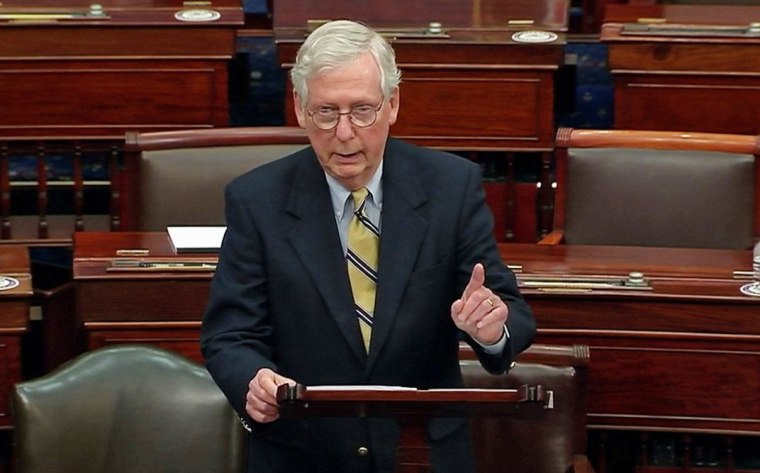Over the course of last week's Senate impeachment trial, "jurors" and the public heard some striking arguments against Donald Trump, holding him directly responsible for inciting the insurrectionist violence against the U.S. Capitol on Jan. 6. But among the most memorable condemnations of the former president came shortly after the trial, from an unexpected source.
Moments after voting to acquit Donald Trump, Senate Minority Leader Mitch McConnell gave a speech excoriating the former president for a "disgraceful dereliction of duty" and said he holds him responsible for "provoking" the Jan. 6 siege of the Capitol. McConnell was among the 43 Republicans who voted that Trump was "not guilty" on the charge of incitement of insurrection.
If you missed the Republican leader's prepared remarks, McConnell's office posted them to his Senate website, and the speech is worth reading, if for no other reason than it seems like a compelling case for a conviction.
"There is no question -- none -- that President Trump is practically and morally responsible for provoking the events of that day. No question about it," the Senate GOP leader explained. "The people who stormed this building believed they were acting on the wishes and instructions of their president. And their having that belief was a foreseeable consequence of the growing crescendo of false statements, conspiracy theories, and reckless hyperbole which the defeated president kept shouting into the largest megaphone on planet Earth.
McConnell went on to say, "Sadly, many politicians sometimes make overheated comments or use metaphors that unhinged listeners might take literally. This was different. This was an intensifying crescendo of conspiracy theories, orchestrated by an outgoing president who seemed determined to either overturn the voters' decision or else torch our institutions on the way out."
Though the Kentucky senator didn't explicitly call for Trump's prosecution, it did not go unnoticed that his remarks added, "We have a criminal justice system in this country. We have civil litigation. And former presidents are not immune from being held accountable by either one."
This position did not come out of nowhere. Within days of the deadly Capitol attack, McConnell's office let it be known that the Senate GOP leader saw Trump's actions as impeachable -- leading to reporting that McConnell made no effort to contest. Soon after, McConnell sent a letter to colleagues leaving the door open to a conviction, which was a position that bore no resemblance to the role he played during Trump's first impeachment trial.
Though the remarks were quickly overshadowed by the riot, McConnell delivered floor remarks on Jan. 6 describing his vote to certify Joe Biden's victory as "the most important" of his lengthy career. "The voters, the courts, and the states have all spoken," the Republican leader added. "If we overrule them all, it would damage our republic forever."
The day before Inauguration Day, when the Senate reconvened, McConnell again took to the chamber floor, acknowledged that the rioters had been "fed lies," and blamed Trump for having "provoked" the mob.
All of which culminated in the GOP leader condemning Trump once more on Saturday for the former president's "disgraceful dereliction of duty."
And yet, despite all of this, McConnell voted not to have the trial, not to hear from witnesses, and not to hold the former president accountable for his actions. The senator defended his position by insisting that after "intense reflection," he concluded that senators "have no power to convict and disqualify a former officeholder who is now a private citizen."
On the merits, it's a difficult position to accept, not only because of precedent and scholarship, but because the Senate considered and rejected the argument, leaving "jurors" to simply consider the case on the merits. McConnell settled on a dubious principle and then pretended to be bound by its constraints.
Just as importantly, let's not lose sight of the timeline of events. Ahead of Jan. 20, McConnell could've brought the Senate back into session to hold an impeachment trial before Trump left office, but he refused. After Jan. 20, McConnell argued that the Senate couldn't convict Trump because he was no longer in office.
Or put another way, the Senate Republican leader might have been willing to hold Trump accountable, if only the Senate Republican leader's procedural moves hadn't gotten in his own way.
Stepping back, it's easy to believe McConnell was genuinely disgusted by the former president's misconduct. It's also easy to believe the GOP senator is convinced that his party would be better off leaving Trump behind.
But the Senate minority leader doesn't appear willing to do anything meaningful about these beliefs, which strips his many speeches of any real value.

